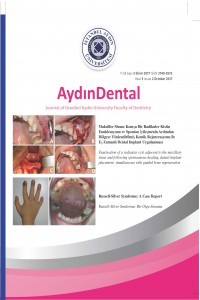ÇENELERDEKİ KİSTİK LEZYONLARIN DEKOMPRESYONUNDA KULLANILAN STENTLER ÇENELERDE KULLANILAN DEKOMPRESYON STENTLERİ
Çenelerdeki kistik lezyonlar; basit drenaj, enükleasyon, küretaj, marsüpyalizasyon, marjinal veya segmental rezeksiyon gibi çeşitli yöntemlerin tek başına veya kombine olarak uygulanması ile tedavi edilebilmektedir. Bunlardan marsupyalizasyon; kistik lezyonla oral kavitenin bağlantısını sağlayan cerrahi bir açıklık sağlanarak kist kavitesi içeresindeki basıncın azaltılması yani dekompresyonu işlemidir. Dekompresyon sırasında kavite içerisindeki basıncın azaltılması ile kemik yapımının indüklendiği düşünülmektedir. Tedavi başarısı; kist kavitesiyle oral kavite arasındaki cerrahi açıklığın korunması ve bu açıklık aracılığıyla kavitenin irrige edilebilmesiyle doğrudan ilişkilidir. Çok çeşitli şekil ve materyalden olabilen bu stentler açıklığın kapanmasını engellerken; çevre dokuları irrite etmeyen, çiğneme ve konuşma gibi fonksiyonel hareketlere izin verebilen ve hasta tarafınca temizlenebilen bir yapıda olmalıdır.
Anahtar Kelimeler:
Dekompresyon; Çene Kistleri, Marsupyalizasyon
STENTS USED FOR DECOMPRESSION OF CYSTIC LESIONS IN THE JAWS
Cystic lesions on the jaw scan be treated by
applying various methods alone or in combination
such as simple drainage, enucleation, curettage,
marsupialization, marginal or segmental resection.
Marsupialization is the procedure of reducing the
pressure in the cyst cavity by providing a surgical
opening that connects the cystic lesion and the
oral cavity. It is thought that bone production is
induced by reducing the pressure inside the cavity
during decompression. Success of the treatment is
directly related to the preservation of the surgical
opening between the cyst cavity and the oral cavity
and the ability to irritate the cavity through this
opening. Stents, which can be of various shapes
and materials, prevent the opening from closing; it
should be in a structure that does not irritate the
surrounding tissues, allow functional movements
such as chewing and speech and can be cleaned by
the patient.
Keywords:
Decompression Jaw Cysts, Marsupialization,
___
- KAYNAKLAR 1. Gao L, Wang XL, Li SM, Liu CY, Chen C, Li JW, Yan XJ, Zhang J, Ren WH, Zhi KQ. Decompression as a treatment for odontogenic cystic lesions of the jaw. J Oral Maxillofac Surg 2014;72(2): 327-33. 2. Jung EJ, Baek JA, and. Leem DH, Decompression Device Using a Stainless Steel Tube and Wire for Treatment of Odontogenic Cystic Lesions: A Technical Report. Maxillofac Plast Reconstr Surg 2014;36(6):308-10. 3. Kolokythas A, Schlieve T and Miloro M. Simple method for securing a decompression tube for odontogenic cysts and tumors: A technical note. Journal Oral Maxillofac Surg 2011;69(9):2392-5. 4. Tolstunov L. Marsupialization catheter. J Oral Maxillofac Surg 2008; 66(5):1077-9. 5. Hou R and Zhou H. Articles of marsupialization and decompression on cystic lesions of the jaws: a literature review. J Oral Maxillofac Surg Med Pathol 2013;25(4):299- 304. 6. Carter LM, Carr P, Wales CJ and Whitfield PH. Customised stents for marsupialisation of jaw cysts. Br J Oral Maxillofac Surg 2007;45(5): 429-31. 7. Al-Benna S and Arayathinal T. The use of dual nasal trumpet stents to decompress keratocystic odontogenic tumours. Ann R Coll Surg Engl 2018; 100(6): 497-8. 8. Nam OH, Lee JW, Song KU and Choi SC. Patient-orientated removable space maintainer as a decompression stent. Br J Oral Maxillofac Surg 2016;54(7): 836-7. 9. Rehman KU, Opie N, Parmar S and Jeynes P. The oral grommet. Br J Oral Maxillofac Surg 2008;46(8): 692-3. 10. Srinivasan P, Mohan S and Kumar RP. A Soft, Flexible Stent/Bung for Marsupialisation. J Maxillofac Oral Surg 2015;14(2): 497-8. 11. Serra e Silva FM, Sawazaki R and Moraes M. Eruption of teeth associated with a dentigerous cyst by only marsupialization treatment: a case report. J Dent Child 2007;74(3):228-30. 12. Wiemer SJ, Pruitt CA, Rallis DJ and Viozzi CF. Use of a modified removable partial denture as a marsupialization stent in a pediatric patient. J Oral Maxillofac Surg 2013;71(8):1382-6.
- ISSN: 2149-5572
- Yayın Aralığı: Yılda 3 Sayı
- Başlangıç: 2015
- Yayıncı: İstanbul Aydın Üniversitesi
